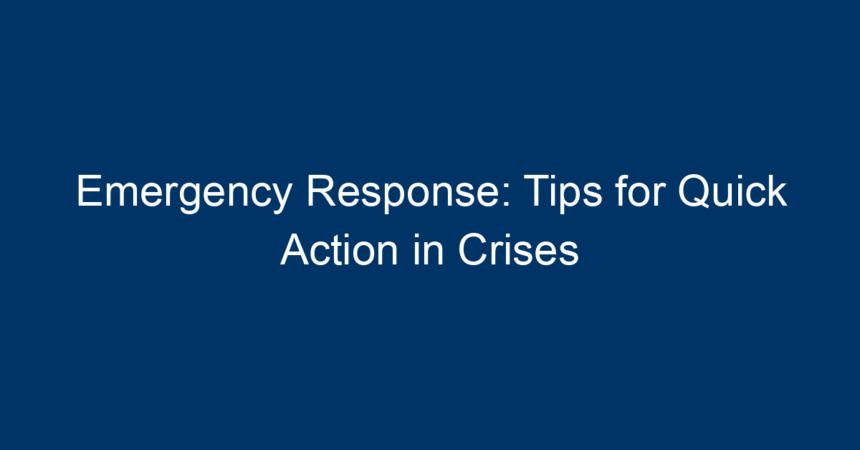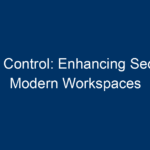In our unpredictable world, emergencies can strike at any moment, often catching us off guard. Whether it’s a natural disaster, medical emergency, or unforeseen crisis, a prompt and effective emergency response can mean the difference between chaos and order, safety and danger. In this article, we will delve into essential tips for quick action during crises, ensuring you’re prepared when it truly matters.
Understanding Emergency Response
Emergency response refers to the readiness and actions taken to address urgent situations. This involves multiple steps, including preparation, communication, and execution. An effective emergency response can significantly reduce risks and harm, whether in personal situations or larger community-wide emergencies.
The Importance of Preparedness
Preparation is the cornerstone of an effective emergency response. When you anticipate potential crises, you empower yourself with the knowledge and tools needed to act swiftly. Here’s how to get started:
Identify Potential Crises
Begin by assessing the types of emergencies that might occur in your area or situation. Consider natural disasters like earthquakes, floods, or hurricanes. Also, think about personal emergencies, such as medical issues or fires. Understanding the risks enables you to better prepare.
Create an Emergency Plan
An emergency response plan outlines specific actions to take during various emergencies. This plan should include:
- Contact Information: List key contacts, including family members, local authorities, and emergency services.
- Meeting Points: Designate safe meeting places for family members or team members in case of a crisis.
- Resource Inventory: Keep an updated list of essential supplies and equipment, such as first-aid kits, flashlights, and water.
Educate and Train
Knowledge is power. Conduct regular training sessions for yourself, family, or employees. This could include first aid training, fire drills, or basic survival skills. The more informed everyone is about the emergency response plan, the more effective the response will be.
Responding Effectively During an Emergency
When an emergency strikes, the initial moments are critical. Here’s how to maximize your chances of a successful emergency response:
Stay Calm and Assess the Situation
Panic can cloud judgment. Take a deep breath and assess your surroundings. Determine what type of emergency you’re facing and who is affected. This initial assessment allows you to prioritize your next steps effectively.
Communicate Clearly
Effective communication is vital during emergencies. Use clear and concise language when relaying information to those around you. If you’re in a public space, use loud and direct voice commands. For personal emergencies, employ established signals or codes to avoid misunderstandings.
Activate Your Emergency Response Plan
Once you assess the situation, activate your emergency response plan. This involves:
- Notifying Emergency Services: Call 911 or your local emergency number immediately if necessary. Provide your location and a brief description of the emergency.
- Initiating Safety Protocols: Depending on the situation, this may involve evacuating, sheltering in place, or administering first aid.
- Utilizing Resources: Deploy any resources you’ve prepared in advance, such as first-aid kits or emergency bags. Being well-prepared can make a significant difference in your effectiveness.
Special Considerations for Specific Emergencies
Different emergencies require tailored responses. Here are some tips for specific types of crises.
Medical Emergencies
In the case of a medical emergency, time is of the essence.
- First Aid Skills: Basic first aid training can empower you to administer critical interventions like CPR or wound care. Ensure your first-aid kit is stocked and easily accessible.
- Know When to Call for Help: If someone’s life is in danger, calling 911 should be your top priority.
Natural Disasters
Natural disasters present unique challenges. Here are strategies for effective emergency responses:
- Stay Informed: Use apps or local news sources that provide real-time updates about weather alerts, evacuation orders, or emergency instructions.
- Prepare an Emergency Kit: Have an emergency kit ready with non-perishable food, water, medications, and clothing. Ensure it’s easy to grab in case of an evacuation.
Fire Emergencies
House fires can escalate quickly. Here’s how to respond:
- Know Your Escape Routes: Familiarize yourself with all exits in your home or building. Conduct regular fire drills with your family or team.
- Use a Fire Extinguisher: Understanding how to properly use a fire extinguisher can help contain small fires before they spread.
Recovery: The Aftermath of a Crisis
Once the immediate danger has passed, the focus shifts to recovery. An effective emergency response doesn’t end with the crisis; it includes actions for the aftermath as well.
Assess Damage and Take Inventory
Evaluate the situation and take stock of the damage. This is critical for insurance claims and restoring normalcy. Document everything thoroughly, including images and lists of damaged items.
Seek Support
Don’t hesitate to reach out for Unterstützung. This might include talking to supportive friends or family, counseling services, or even local resources. Recovery is a process, and it’s essential to acknowledge the emotional toll that crises can take.
Review and Revamp Your Emergency Response Plan
After the crisis, take time to review your emergency response plan. Discuss what worked, what didn’t, and what can be improved. Keeping your plan adaptable and current is crucial for future effectiveness.
Conclusion: Actionable Insights for Effective Emergency Response
Emergencies can happen unexpectedly, but being prepared allows you to act swiftly and decisively. Here are a few actionable insights to enhance your emergency response capability:
- Develop a Comprehensive Emergency Plan: Tailor your plan to potential local emergencies and ensure everyone knows it.
- Regularly Train and Practice: Frequent drills and training enhance your readiness and confidence.
- Stay Informed and Connected: Use reliable sources for updates and maintain communication with family or team members during crises.
- Review and Update: After every crisis, assess your performance and update your plan accordingly.
By integrating these strategies into your emergency response preparations, you enhance safety for yourself and those around you. Remember, success in emergencies lies in your ability to plan ahead and act decisively when it matters most.




